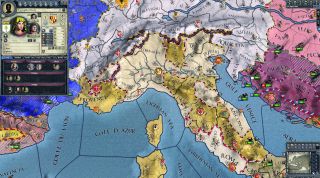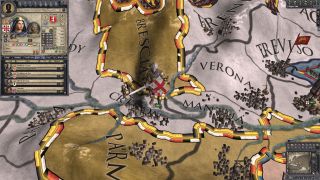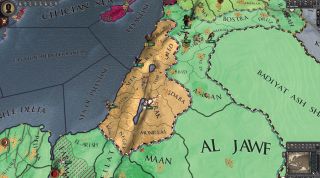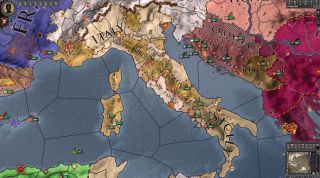Crusader Kings 2 diary: How far can one AI go using wits, skill, and lots of cheats?
Let's see if a guiding hand and some console commands create a new world order.

Matilda di Canossa—the real one—had a fascinating life. By the age of 31, the Margravine of Tuscany had survived (and was even rumoured to have ordered) the assassination of her first husband, Godfrey the Hunchback, whom she despised. In 1077, King Henry IV of the Holy Roman Empire stood barefoot in the snow outside her castle for three days, seeking penance from the Pope, whom she was protecting. Over the decades, she would rebel against Henry many times, and even secure military victories against his armies.
Look, I don’t want to make it sound like every problem can be solved by a murder, but I think this problem can be solved by a murder.
My Matilda di Canossa—the Crusader Kings II one—is essentially a turbocharged version of her historical counterpart. She’s the Queen of Sardinia and Corsica (a kingdom that also comprises her original Italian duchy), and, at the age of 31, seceded from the Holy Roman Empire after a war against its new ruler, Kaiser Ordulf the Drunkard, who currently lives in her dungeons. This was all possible because I’m not actually playing Crusader Kings II. Instead, Matilda is being controlled by the AI. I’m just providing support—money, stat boosts, traits and the occasional assassination plot—via console commands.
Right now, Matilda’s biggest problem—other than having pissed off the map’s second largest military power—is her lack of an heir. Matilda has three bastard children, but none with her husband, King Shabsai. This isn’t likely to change anytime soon, mostly because Matilda recently confessed to a fling with her lover, Duke Oberto of Corsica. As a result, Matilda and Shabsai now hate each other. And look, I don’t want to make it sound like every problem can be solved by a murder, but I think this problem can be solved by a murder.
Thanks to a console command, Duke Oberto suddenly decides he wants to kill the King. Unfortunately he’s an incompetent schemer, and so I’m not particularly surprised when his attempt fails. I spam the ‘murder’ command a couple more times, but Shabsai stubbornly refuses to be killed. Crucially, though, Matilda hasn’t yet arrested Oberto for his inept assassination attempts. I take this as a sign of implicit support, and so raise Oberto’s intrigue stat and order him to try again.
All in the execution
It fails, but for a good reason. On April 8, 1078, Duke Oberto is finally executed by Matilda. I’m surprised by her change of heart, at least until I discover that Matilda has harboured a grudge against Oberto since he insulted her and denounced their child. This was probably not his smartest decision, especially when followed by the many, many murder attempts. Matilda immediately takes Duke Tiziano of Spoleto as her new lover, and I decide to abandon my role as the medieval world’s worst marriage counselor.
I’m distracted in part by a war. Matilda is moving against Serene Doge Gentile of Pisa. The previous Serene Doge was Matilda’s key ally in her war of secession. But Matilda’s desire for land has eclipsed any loyalty she might feel to the region. Gentile has an eighth of the troops of Matilda. It’s a bloodbath, and the county of Piombino is quickly added to her growing borders. I’m pleased by this expansion. My worry was that, having achieved independence, Matilda’s war machine would slow down. That doesn’t seem to be the case.

On April 7, 1079, Matilda embarks on an antipapal war against the Holy Roman Empire. The Empire, for whatever reason, has established Anastasius V ‘the Ill-Ruler’ as an antipope, attempting to undermine the Vatican and Anastasius IV, the actual Pope. This doesn’t sit well with Matilda, who remains an adamant fan of Popes—both in actual history, where it’s thought she had affairs with both Pope Gregory VII and Pope Urban II, and in Crusader Kings II, where she’s decided to launch an inadvisable war on behalf of the Vatican.
PC Gamer Newsletter
Sign up to get the best content of the week, and great gaming deals, as picked by the editors.
Matilda’s beaten the Holy Roman Empire before, of course, but here she’s also dealing with a large peasant revolt in Brescia, her northernmost territory. I briefly worry, until Matilda’s army marches in and crushes the peasants with almost comical ease. In fact, her forces now rival that of the Empire. Rather than meddle, I decide to let things play out. After all, this war isn’t for land or titles; it’s for the honour of a Pope. There are literally no consequences for success or failure.
The next year is spent watching as two roughly equally sized death balls chase each other around the map—a slow, painful reminder of how irritating Crusader Kings II’s combat can be. By the time the armies do clash, Matilda’s forces have been whittled down by numerous sieges and supply line problems. The Empire wins the battle, but Matilda has done well to cripple key castles and towns. Despite now wielding the smaller force, she’s still winning the war.
While leading troops in the siege of Cremona, Matilda gives birth to her fourth child. What’s notable about Princess Tomasina is that her father is actually Matilda’s husband. Matilda finally has a legitimate heir to her throne. Matilda and Shabsai still despise each other, but, as Jeff Goldblum once said, life, er, finds a way. I suppose I should apologise to Shabsai for trying to have him killed, and maybe also Duke Oberto for inadvertently causing his execution. At the very least, his death wasn’t in vain: we all learned a valuable lesson about not insulting your lover who is also a queen.
Rock, papal, scissors
The antipapal war drags on for years, but the outcome is never really in doubt. Matilda’s army is seemingly inexhaustible—mostly because I’m paying the tab. And even when her armies do take a battering, the rulers of Hungary and Denmark have also rallied to defend the Pope. Generally speaking, it’s a bad idea to fight a war on two fronts, but here the Holy Roman Empire is being besieged on every side—including the middle, which, for whatever reason, is also a patch of Hungary.
Team Pope wins and, less than a month later, Matilda’s armies are already marching to another frontline. This time she’s helping to defend the Queen of Croatia from a holy war started by some Croatian duke. I’m not sure why this is happening. The two queens aren’t allies—in fact, many years ago, Queen Neda’s forces moved against Matilda in defence of the Count of Capua. Perhaps a life of dealing with (and romancing and executing) irritable dukes has made Matilda sympathise with anyone who has to deal with their bullshit.
The war ends quickly—inviting Matilda to settle a civil war is like inviting a nuclear bomb to settle an argument with your neighbour over an unruly wisteria. Peace returns, briefly, and I take a moment to check on Matilda’s court. I discover that King Shabsai—who at some point in the last decade became a renowned physician—has forgiven Matilda for her affair, and actually seems quite fond of his wife. And yet, despite the fact her home must now be a more pleasant place to live, Matilda is suffering from depression. Crusader Kings II represents depression as a trait, meaning I could remove it using a console command. I won’t, though—there’s no major benefit to doing so, and the fact that a character who’s been magically handed everything she wants can still come down with depression feels significant.

Forever a workaholic, Matilda celebrates her 40th birthday by launching into another decade of wars and rapid expansion. She fabricates and presses a claim on Urbino, bolstering her control of central Italy. She also presses Lord Mayor Belo’s claim on Bentone—a city in Nice, far away from her own borders. This feels particularly dickish. King Gentile the Fat of Pisa still owns Nice itself. But this single city is now part of the Kingdom of Sardinia and Corsica.
It’s around this time that Matilda gains the stressed trait, and I’m not surprised.
It’s around this time that Matilda gains the stressed trait, and I’m not surprised. I get antsy every deadline, and my only job is to fill a magazine with whatever the hell this is. But the admin on Matilda’s increasingly fragmented kingdom must be staggering. It’s time for a confession. I’ve been so focused on Matilda’s many wars that I haven’t paid much attention to the surrounding map. At some point over the last few years, another country gained independence from the Holy Roman Empire. That country is Italy, which is now ruled by King Adalberto III the Liberator. I only realise that any of this has happened when Adalberto declares war on Matilda.
This is a pretty complicated situation, because, as I may have previously mentioned, Matilda’s kingdom is a complete mess. It comprises the islands of Sardinia and Corsica, as you might expect, but also the bulk of central Italy as well as Brescia in the north. (And don’t forget that one city in Nice.) King Adalberto and Matilda’s kingdoms intertwine and wrap around each other in a way that Adalberto doesn’t seem thrilled about. In fact, he appears to take the viewpoint that, as the King of Italy, he is entitled to all of the bits of Sardinia that are actually Italy.
Unfortunately for him, Matilda is OP. The two leaders have similar sized armies, but Matilda is battle hardened from decades of constant war—war for territory, war for freedom, war for the Pope. She has multiple positive combat traits, and even gains a bonus for fighting during the winter. She quashes Adalberto’s attempt to capture Tuscany with relative ease, and, in doing so, prevents Adalberto from pressing another claim against her for at least a decade. At least that gives me some time to figure out whether or not I should murder him.

With Italy momentarily stalled, Matilda continues to expand her borders—targeting Duke Miquel, formerly a subject of the King of Pisa, who now rules Provence, Nice and a few other French territories as an independent duchy. Matilda’s uses her military might to force the duke to be her vassal—presumably claiming that, hey, her kingdom already owns one of his cities.
A few things happen in the last few years of Matilda’s 40s, both personal and professional. Her husband dies of natural causes. No, really—it wasn’t me. In the wake of Shabsai’s death, Matilda shifts focus. Where before she was focused on becoming a good steward, and thus a good administrator of her kingdom, now she’s dedicated herself to learning. She builds an observatory. This new direction does little to quell her love of all things papal, and, when the Catholic Crusade on Jerusalem is called in 1093, Matilda heads to Acre. Her Kingdom commits more troops than any other country, and her support proves invaluable to the Crusade.
The Vatican certainly seem to appreciate the help, which is why, in April 1094, after the Crusade is won, Matilda is gifted the entire kingdom of Jerusalem. And to think she was stressed before.
Current page: Crusader Kings 2 diary part two
Prev Page Crusader Kings 2 diary part one Next Page Crusader Kings 2 diary part three
Phil has been writing for PC Gamer for nearly a decade, starting out as a freelance writer covering everything from free games to MMOs. He eventually joined full-time as a news writer, before moving to the magazine to review immersive sims, RPGs and Hitman games. Now he leads PC Gamer's UK team, but still sometimes finds the time to write about his ongoing obsessions with Destiny 2, GTA Online and Apex Legends. When he's not levelling up battle passes, he's checking out the latest tactics game or dipping back into Guild Wars 2. He's largely responsible for the whole Tub Geralt thing, but still isn't sorry.
Most Popular




